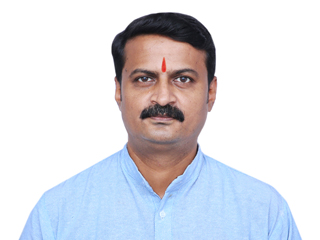Advocate Virendra Ichalkaranjikar writes to the Maharashtra CM and demands the Board share key decisions on its official website

Mumbai – The Government shares standard operating procedures of NGOs that receive grants and other public organisations. It also shares information about governance to ensure complete transparency. This information is readily available on the official websites of the respective ministries and departments. However, the Waqf Board, an Islamic organisation that owns more than 77,000 acres of land in this country, seems to be an exception. Advocate Virendra Ichalkaranjikar, the National President of Hindu Vidhidnya Parishad, has brought this anomaly to light. On 6th January, he wrote to the Minority Development Minister and demanded the Waqf Board share the way it is governed and the key decisions made be shared on its official website. This letter is sent to the Chief Minister’s Office (CMO) as the Ministry of Minority Affairs falls in the purview of the CMO.

In his letter, Advocate Virendra Ichalkaranjikar asked these direct questions to the CM
1. The Indian Judiciary has started the public live telecast of its proceedings. People from across the globe can easily access information such as which case is being heard, what time the Courts will resume their hearings for different cases, how long were they discussed etc. Many Sessions Courts and First-Class Magistrates also maintain their journals which are available on their official websites. They also share the Court verdicts on these websites. They also share specific information such as which case is heard by which judge on a particular date, how long have those been discussed, how long will the judges be on their planned leaves etc.
2. It seems that the Waqf Board is still governed in the same manner which was adopted more than 50 years ago. Why has the Waqf Board refused to adhere to these official guidelines ? Who is the judge, jury and executioner when it comes to this Islamic organisation ? Surprisingly, the way this Board is governed is a well-kept secret to this date. Has the Waqf Board given this exception as a result of some close ties with someone higher up ?
3. Knowledge is power and both are sources of satisfaction. The 21st century is the century of information. In India, why deprive Muslims and non-Muslims of this important information about the way this Islamic organisation runs its day-to-day affairs ?
4. We expect the Maharashtra CMO not to give lame excuses such as lack of funds to maintain such records. We know the State Government and the Waqf Board have deep pockets.
Hindu temples offer generous donations for welfare programmes, what about the Islamic Waqf Board ?
The Government often provides grants to schools and hospitals from the temple coffers. Despite that, we see the temple administrations get scrutinised now and then. The Law and Justice Department have sought clarifications from various temple administrations, while the former Justice ‘Tipnis Committee Report’ was based on Siddhivinayak temple. Have you noticed anyone demanding clarifications or at least some transparency from the Islamic Waqf Board ? Shirdi Devasthan donated Rs 500 crores for the development of canals of the Nilwande Dam in Akole, in Ahmednagar, Maharashtra. Temples that are administered by the Government donated crores of rupees to the Chief Minister Relief Fund. However, the Government, so far, has not dared to ask the Islamic Waqf Board for any donations. Why this religious discrimination against Hindus ? If the Government considers the Vitthal-Rukmini temple which owns 1,200 acres of land, as a wealthy institution, then by the same yardstick, the wealth of the Islamic Waqf Board should be beyond measure as it owns more than 77,000 acres of land in this country. Why is the Government reluctant to share the details about these properties ?
Key demands by Advocate Virendra Ichalkaranjikar
1. The Islamic Waqf Board must have been adding to the total landmass it owns every year. Does the Government keeps records of such transactions and governs the process ? We request the Government to make this information public by sharing it on ‘e-courts.gov.in’ or ‘https://courts.mah.nic.in’. For that, the Government should include ‘Maharashtra Waqf Board’ as an entity on those websites.
2. The Government should take strict against the responsible Waqf Board officials who failed to adhere to the abovementioned Government directives
3. The Government should also take strict against the masterminds who established an opaque operating system which inhibits the petitioners and their lawyers to present a solid case against the Islamic Waqf Board.
4. In all likelihood, it will take more than 10 years to make all such information public. Until then, the Government should develop a bespoke website or an android app to share all available information as soon as possible.

 Religious fanatic Muslims attack Hindus in Malda (Bengal)
Religious fanatic Muslims attack Hindus in Malda (Bengal) More than 1,000 dead : Myanmar and Thailand earthquake
More than 1,000 dead : Myanmar and Thailand earthquake Delhi BJP Government to celebrate Hindu New Year with grandeur
Delhi BJP Government to celebrate Hindu New Year with grandeur A grand Hindu Saints’ Convention in Malegaon on the occasion of Gudhi Padwa, to be attended by Sadhvi Pragya Singh Thakur
A grand Hindu Saints’ Convention in Malegaon on the occasion of Gudhi Padwa, to be attended by Sadhvi Pragya Singh Thakur Veer Tejaji Temple vandalised in Jaipur (Rajasthan)
Veer Tejaji Temple vandalised in Jaipur (Rajasthan) 16 Naxals killed in encounter in Sukma (Chhattisgarh)
16 Naxals killed in encounter in Sukma (Chhattisgarh)